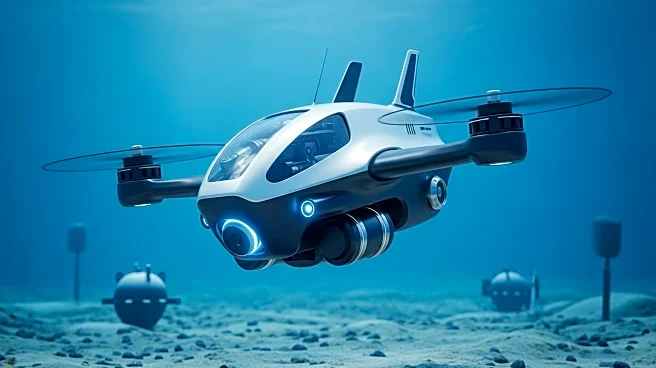What's Happening?
European navies, including Germany, Portugal, and France, are testing new drone technology for undersea operations as part of NATO's Dynamic Messenger and REPMUS exercises. These drills, held in Sesimbra, Portugal, focus on utilizing over 200 unmanned systems to improve mine countermeasures warfare and protect critical underwater infrastructure. The German Navy showcased the Greyshark autonomous underwater vehicle, equipped with advanced sonar and detection systems, capable of long-range operations. Additionally, the Sonobot and Quadroin drones were used for underwater positioning and mine detection. The exercises aim to enhance coordination and control of multiple robotic systems, with future plans to integrate artificial intelligence for threat classification.
Why It's Important?
The testing of advanced drone technology by European navies signifies a shift towards more autonomous and efficient methods of conducting undersea operations, particularly in mine countermeasures. This development is crucial for enhancing maritime security and reducing risks to human divers. The integration of AI in these systems could further streamline operations, allowing for faster and more accurate threat detection and classification. As naval forces increasingly rely on unmanned systems, this could lead to significant changes in military strategies and procurement, impacting defense budgets and technological innovation in the sector.
What's Next?
The exercises are expected to continue with increasing complexity, testing the readiness of different units under strict time constraints. The integration of AI into unmanned systems is anticipated to be a key focus, potentially revolutionizing mine warfare operations. As these technologies advance, European navies may seek further collaboration with allies, including the U.S., to enhance their capabilities. The successful implementation of these systems could lead to broader adoption across NATO forces, influencing future military strategies and defense policies.
Beyond the Headlines
The use of unmanned systems in naval operations raises ethical and legal questions regarding the automation of warfare and the potential for reduced human oversight. As AI becomes more integrated, concerns about accountability and decision-making in military contexts may arise. Additionally, the environmental impact of increased drone activity in marine ecosystems could become a topic of discussion, prompting considerations for sustainable practices in military operations.









